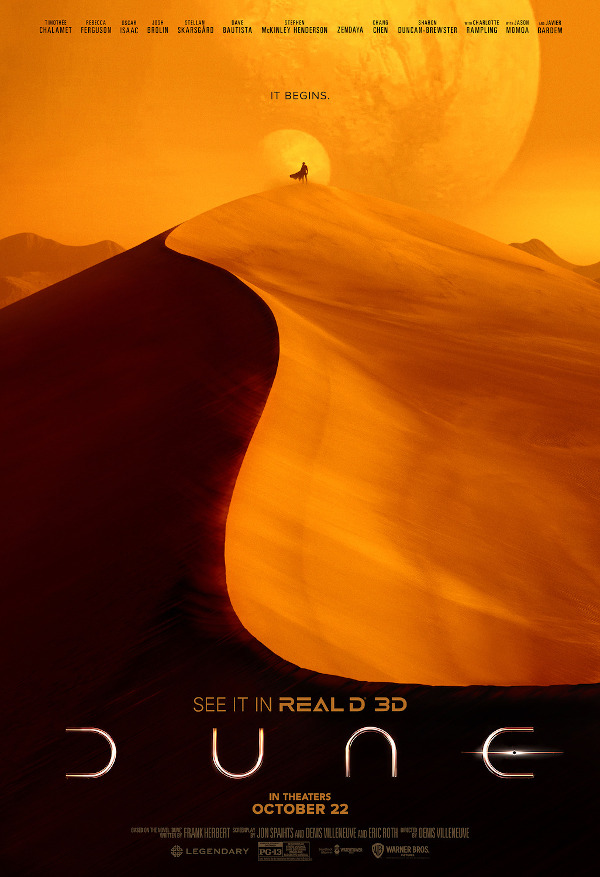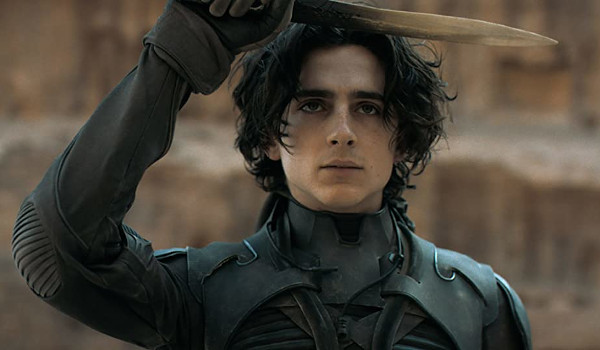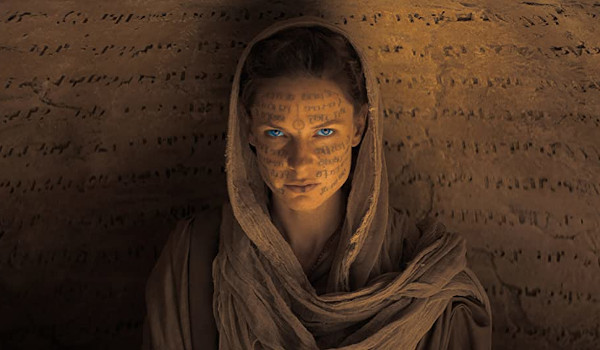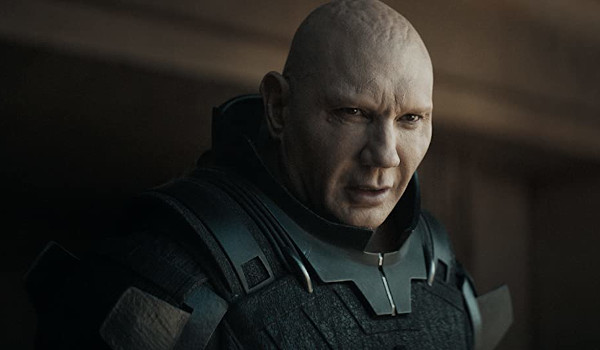- Title: Dune (2021)
- IMDb: link

 More coherent, but less complete, than David Lynch‘s bizarre 1984 film, director Denis Villeneuve‘s adaptation of the first half of Frank Herbert’s Dune is rich and elaborate storytelling. Don’t get me wrong, it’s still Dune, meaning the story is still complex and bizarre, but, despite only giving us half the story, offers a more satisfying movie experience.
More coherent, but less complete, than David Lynch‘s bizarre 1984 film, director Denis Villeneuve‘s adaptation of the first half of Frank Herbert’s Dune is rich and elaborate storytelling. Don’t get me wrong, it’s still Dune, meaning the story is still complex and bizarre, but, despite only giving us half the story, offers a more satisfying movie experience.
Breaking the film into two halves allows this Dune to spend more time with character, worldbuilding, and setting the stage for a hero’s emergence which won’t fully be explored until the next movie. Gone are the emperor, who is referred to but never seen, the odd space traveling creatures of Lynch’s film, the sound-based weapons which will play such a pivotal role in the second-half of the story, and the narration of the emperor’s daughter which helped explain the story and the large gaps necessary for Lynch to fit the entire tale into a single film.
In the vast story of politics, space witches, magic sand, travel across galaxies, giant worms, and class struggle, this version of Dune focuses on relationships and the small moments between characters. Focusing on parents’ love for their son, a young man’s pull towards a woman he’s never met, the love and respect of a soldier to his ruler and his family, Villeneuve and co-writers Jon Spaihts and Eric Roth are careful never to lose their characters in the wider tale of destiny unfulfilled.
The film looks fantastic. While it might be a bit too reminiscent of production design from some of Villeneuve’s previous films, the spaceships of the great houses and the planet Arrakis are fully realized. The script doesn’t get lost in trying to make sense of the dust, this magical sand with extraordinary properties, whose value is at the heart of the film. Yes, we still get the floating fat man (Stellan Skarsgård) who takes oil baths, but Villeneuve, for the most part, attempts to avoid weird simply for weird’s sake. The world of Dune is alien to be sure, but at the heart its story is very human.

Adapting about half of the events covered in Lynch’s version, the film introduces House Atreides who has been assigned control of the the planet Arrakis whose unique resource helps the empire continue to expand. Control of the planet is stripped away from House Harkonnen, a longtime rival, and given to Duke Leto Atreides (Oscar Isaac) who only somewhat understands the machinations the jealous emperor has employed to take down what he sees as an increasingly popular rival.
Traveling to Arrakis with the Duke are his witchy concubine (Rebecca Ferguson) and his son Paul (Timothée Chalamet) who carries more than a little of his mother’s witchly power making some, including some of the locals of Arrakis known as Fremen, believe he might by a legendary Kwisatz Haderach destined to change the universe forever. The film takes us through their arrival on Arrakis, the betrayal and battle for control of the planet, and closes with Paul beginning his new life in the desert with the literal woman of his dreams (Zendaya, who only appears in a handful of scenes mostly in Paul’s vision of future events).

Casing wise, this version of Dune is superior in every way to Lynch’s film. Chalamet is a giant step-up from the wooden performance of Kyle MacLachlan in the pivotal role of the story. Isaac and Ferguson are also put to good use, although it’s hard to judge Zendaya given her limited role. Josh Brolin, Dave Bautista, and Jason Momoa each get their moment as the film’s most notable warriors.
Villeneuve’s movie isn’t perfect. Spending a half-hour longer than Lynch’s film to provide us only half a story leaves the audience with an incomplete experience not dissimilar to The Hobbit films. The choice certainly helps explain and explore the characters in far more depth than Lynch had the opportunity to do while leaving much of the larger scope of Paul’s journey and destiny to be tackled in the second film. Despite all that works, the story is still incomplete. That said, this adaptation of Dune works better than I could have expected and should please fans as well as those stepping onto the sands of Arrakis for the first time.


